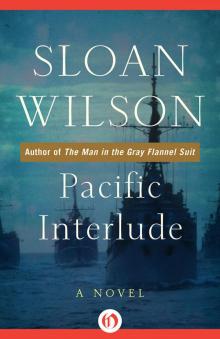- Home
- Sloan Wilson
Pacific Interlude Page 6
Pacific Interlude Read online
Page 6
The forecastle was a V-shaped compartment with three tiers of bunks on each side, a table in the middle. It was dirty and paint was flaking from the bulkheads. Although the weather was comfortable outside, it was much too hot here. Six men who were off watch were sweating as they slept in their undershorts.
“When eighteen men get in here, they’re not going to be much better off than niggers on a slave ship,” Buller said.
Syl shrugged.
“Can you imagine what this is going to be like when we get to New Guinea? You’ll be able to bake bread in here.”
“A lot of the men will sleep on deck.”
“Why aren’t there more vents here? They can hardly get a breath of air.”
“When we run into a heavy head sea we’ll be shoving this whole bow under green water. I suppose we could put in some kind of watertight hatch or air funnels—”
“How about air conditioning?”
“I never heard of it aboard ship. I doubt if even the big carriers have much of it.”
“That’s no reason our men have to roast. There are plenty of big refrigerator components around here. If I can get the parts I can figure out something that will work.”
“I’m not sure we have the juice for that sort of thing.”
“So maybe we’ll have to put in a new generator. There’s plenty of space in the engine room.”
“Have you talked to Mr. Wydanski about this?”
“He said it’s all up to you.”
“How much would the equipment cost?”
“I don’t know yet, but I’m a great scrounger. I bet I can steal most of it.”
“Let’s go back to my cabin.”
They walked through the clouds of steam. They found Simpson lying in his bunk reading his Bible. He made no move to leave when they came in.
“Mr. Simpson, this business of sharing a cabin is going to present difficulties,” Syl said. “This place has to be my office. Sometimes I’m going to have to ask for privacy.”
“Aye, aye, sir,” Simpson said, snapped his Bible shut and went out, closing the door behind him with exaggerated quietness.
“Can’t we get rid of that little son of a bitch?” Buller said.
“He’s a good officer in many ways and he knows this ship. Look, your air-conditioning idea is good, but we can’t put it high on our priority list. I hereby appoint you supply officer of this ship. Here’s a checklist I made out with a number by each item to give its priority. You’ll note that spare parts for the engine and a medical chest head the list.”
“I’ll get all this stuff—don’t worry about that. Do you mind if we buy a secondhand truck? We can sell it just before we leave.”
“Okay—go ahead. And work with Mr. Wydanski on the air conditioning—as the ship’s engineer, he has to be in charge of it.”
“That crazy old Polack wouldn’t know an air-conditioner from an Airedale—”
“He’s a hell of a lot smarter than you think. He also outranks you. You’ll have to work with him.”
“I’ll try, but the only thing more stupid than a regular Coast Guard officer is the Polack reserve—”
Syl was saved from having to reply to this one by a knock on the door. Cramer stood there, his cap in his hand.
“I’m sorry to interrupt, skipper,” he said. “When you have time, I’d like to talk to you.”
“Come on in. Mr. Buller and I have finished.”
“One more thing, skipper,” Buller said. “The men are moving into the house as soon as they get off of here tonight. Can they leave about four o’clock?”
“There’s nothing much for most of them to do aboard here right now. Tell Mr. Simpson that I said anyone not needed for some reason can go anytime. Just make sure a proper watch is kept.”
“That’s great,” Buller said. “The boys want to throw a big party tonight and lots needs to be done. Will you go?”
“I will.”
“I’ll pick you up here at about six o’clock. By that time I’ll have some kind of an old truck. I’ve got one of the machinist’s mates out looking for one now.”
He left and Cramer came in. Syl asked him to sit down on the edge of one of the bunks but he preferred to remain standing. When he was near Buller he did not look big, but he was about six feet tall, broad-shouldered and narrow-waisted, tough despite his gray hair.
“Captain, I guess you heard there was some trouble in the forecastle last night …”
“What happened?”
“Some of the guys came in drunk. That’s not so surprising when you figure it was their first night in Australia.”
“I’m not surprised.”
“They began fighting about who would get the lower bunks, or at least that’s how it started. They tangled it up pretty good. I was afraid somebody would get really hurt so I put a stop to it.”
“How?”
“First I ordered them to stop. They didn’t. Now what do you think I should have done?”
“How many men were involved?”
“Four, sir, and then a fifth joined in to help me. That was Grinelli.”
“How many other men were aboard?”
“About ten, sir.”
“Next time you have to stop a fight, round up a gang of at least twice as many men as are involved and jump ’em. That way you can smother a fight, not just add to it.”
“Most of the others were dead drunk, sir.”
“I can see you had a problem.”
“Not really. I knocked a few heads together and got everything quieted down in jig time. My only problem is Mr. Simpson. He wants to court-martial me or something.”
“He wants to restrict you to the ship for thirty days.”
“I’d rather be court-martialed. So take my stripes away.”
“That won’t be necessary, but you realize that it’s against regulations for anybody in the service to hit anybody—”
“I didn’t hit. I just knocked heads.”
“Any physical attack is against the law, and I guess for good reason. You could hurt someone bad and if one of them hit you, he could be hung for attacking a chief petty officer. It would be better to let the boys fight it out than to wade in without enough force to smother it.”
“Sir, I don’t think this is liable to happen again.”
“Has everyone permanently reformed?”
“No sir, but I used to be a prison guard and I know men pretty well. If you put a bunch of prisoners who don’t know each other in a cell, there will be a lot of lighting until they set up what the warden called a pecking order. After that they usually don’t bother each other too much.”
“That sounds about right, but I hate to think we’re running a ship like a prison.”
“In a lot of ways it’s about the same thing, ain’t it?”
“Was there any officer aboard when that fight started?”
“Just Mr. Simpson, sir. I told him right off. He said I was master of arms and I should handle it.”
“Next time you have trouble, call me if I’m here.”
“Sir, the boys all know I’m head rooster now. There ain’t going to be no more trouble.”
“We’ll forget this whole incident, but I don’t want you to knock any more heads. I’d rather have you use firehoses.”
“In the forecastle? That would wet a lot of beds.”
“You win, chief,” Syl said with a laugh, “but if any man charges that you hit him, you know what I’ll have to do.”
“Yes sir, but they’re all glad that I settled it there and then. They like that better than being restricted for thirty days.”
“Carry on, chief. If we have to have a pecking order, I’m glad the master of arms is head rooster.”
Cramer left and Syl rubbed his eyes for a moment before adding new items to his checklist. All fire-fighting equipment should be inspected, of course. Did they have the latest gear, spray nozzles and foam? How about asbestos suits?
Simpson came in without knocking—af
ter all, it was his cabin too.
“Sir, the yard has finished steaming,” he said. “Would you like to inspect the tanks?”
Syl could think of a few things he would like to do less but if he was going to be captain of a gas tanker … “Sure, maybe you better ask Mr. Buller and Mr. Wydanski if they’d like to come along.”
Before descending into the first tank Simpson gathered the three other officers around the open hatch.
“How many of you gentlemen have served aboard a tanker?” he asked.
“Me, but it was a long while ago and she was nothing like this one,” Wydanski said while the others were silent.
“Then perhaps you won’t mind if I run through the little lecture I give to the men,” Simpson said. “In the first place, we never can go into the tanks unless they have been steamed or we are wearing air masks. We only have one air mask and that doesn’t work too good.”
“I’ll get more,” Buller said.
“They’re hard to find,” Simpson went on. “We always have to remember that even when a tank is so-called empty, it’s always full of fumes unless it’s been steamed. Those fumes are much more explosive than liquid gasoline. A tanker is much more dangerous when empty than loaded.”
“Anybody knows that,” Buller said.
“Let him go on,” Syl said. “I want to hear the whole lecture.”
“Thank you, captain,” Simpson said. “Gas fumes can kill you if you breathe them even if they don’t blow you up. Just a few whiffs will make you feel drunk—some of the guys like it. Breathe a little more and you’ll get terrible aches in your joints, especially the elbows and knees. Breathe still more and your skin, especially your face, will be turned gray by some kind of lead poisoning and you’ll die.”
“You’d have to be a damn fool to get that much,” Buller said.
“Unless you were working on the cargo pump and had to stay down there until it was fixed,” Simpson said. “Now I’m going into this tank. Because it’s steamed, I have a flashlight. Otherwise no light could be used because they all make sparks. I’ll call you after I get down. If you follow each other too soon you’ll get rust from the ladder in your face.”
Syl waited until all the others had squeezed through the hatch, which looked like the conning tower of a small submarine. After making sure they were all clear of the ladder, he followed. He had always had to fight a fear of heights and climbing down in the darkness was even worse. He suffered a twinge of claustrophobia and had to force himself down as though gravity had been reversed. Despite the steam, the odor of gasoline was still strong. When Simpson finally put on his flashlight it showed red rusty bulkheads all around them. The voices of the men echoed back and forth eerily. When Syl finally reached the bottom, which was slightly curved, his hands ached from having gripped the rusty rungs of the ladder so hard.
Going to the side of the ship, Simpson took a screwdriver from his pocket and tapped the metal with the wooden handle. Scales of rust fell down and red dust blossomed in the beam from the light.
“We’ve got the gasoline eating from the inside and salt water eating from the outside,” he said. “God knows how much good steel is left.”
“If we want to get in on the secret, we could test it,” Buller said.
“They don’t have any fancy sonic devices for doing that here,” Simpson said.
“Why can’t we just bore a hole?” Buller asked.
“You’ll note that rust makes a kind of corrugated surface. The thickness would vary so much from place to place that one hole wouldn’t mean much. You’d have to drill so many holes that you’d weaken the ship.”
“I wouldn’t worry about it,” Buller said. “Hell, this bucket isn’t more than about five years old, is she?”
“She was built in 1939,” Simpson said, “but this is the first time she’s been hauled in two years. She was Merchant Marine before the army took her. I doubt if she was ever well maintained.”
It was obvious that Simpson, for whatever reasons, was bent on making the Y-18 look even more dangerous than she was. He was almost like a little boy trying to scare his friends during a tour in a “haunted house” as he led them through all six tanks and the well-like shaft to the compartment for the cargo pump.
That was the worst. There was so little space they had to go down there one at a time. The pump looked to Syl like a rusty old steam engine, though it was powered by a Cummins diesel in the engine room and a connecting shaft.
“That pump is old and it breaks down all the time,” Simpson said when they had all inspected it. “When it does, it often leaks gasoline. I’ve often seen Mr. Matson, our old engineer, standing up to his rear end in gas down there, trying to turn rusty nuts in the dark with a wrench wrapped in tape to prevent sparks. One spark, of course, and that would be it.”
“Why couldn’t you empty the compartment with hand pumps before going down there?” Wydanski asked. He had been silent until this part of the lecture, but did not look intimidated.
“You could if you weren’t in a hurry and had the right hand pumps, which we don’t,” Simpson replied. “You got to remember that the army is always in a hurry. If we can’t get this cargo pump going, they unload us with gasoline-driven portable pumps on deck. They suck the stuff right up through the hatches. Of course that mixes air with the gas and the whole secret of handling the stuff is keeping air away from it. The hose connections on those portable pumps are made for water, not gas. They leak. I’ve seen our decks running with gas for three days while they unloaded us that way. Worst of all, the motors of those pumps were backfiring, stabbing flame just a few feet away from the gas. I tell you, it’s a miracle that this ship is still afloat.”
“Is that the end of the lecture?” Syl asked drily.
“One more thing, sir. Sometimes the army makes us dump gas at sea.”
“Why?” Syl asked.
“Sometimes the big tankers will give us a load of high octane and low octane that got mixed, or we’ll have half a cargo of low octane when they want us to take a full load of av gas for the planes. The army don’t care about waste. Lots of times we’ve been told just to dump the stuff at sea. The thing is that dumping gas at sea is dangerous. You create a cloud of gas fumes that could be a mile long. If anything, even like some native in a dugout canoe, touches it off, you got a fire cloud that can destroy everything around it.”
“I guess we’ll have to go far out and find ourselves a patch of empty ocean,” Syl said. “If we steam into the wind we’ll be all right.”
“You’ve got it right, sir, but if the army is yelling at us to hurry because it’s an emergency, it takes guts to go far enough to sea. Down near Guadal last year, one of our sister ships took a chance because there was an offshore wind. She dumped her gas about a mile off the beach. Then the wind changed and blew the stuff in.”
“And?” Buller said.
“Some GIs were cooking hot dogs in a fire on the beach. A lot of native kids were hanging around. A little girl who was wading got some of the gas on her legs. Naturally it made her feel cold, like gas does, and she went running to the fire. That set her on fire and she ran back to the ocean to put herself out. Then the whole waterfront went up. It took out most of the base.”
“What did they do to the captain of the tanker?” Wydanski asked after a moment of silence.
“Nothing much,” Simpson said with a shrug. “It was an accident. I guess he got a letter. The army got some blame too—they’d ordered him to rush rush rush.”
“Well, gás ain’t always so dangerous,” Buller said. “Hell, they run it around Louisiana in tankers left over from the First World War and they hardly ever get in any trouble. Once a loaded gas barge blew into a swamp during a hurricane. Some bums found it and moved aboard. They built a fire on deck and lived there for two weeks before the thing was found. It never exploded.”
“If it had been an empty gas barge it would have blown,” Simpson said. “God sure must have loved those bums.”
/> A masked crew of Australian workers climbed aboard armed with cutting torches and began to strip away the damaged side of the pilothouse.
“The yard sure isn’t wasting any time now,” Syl said.
“I hear the army is really putting the pressure on them,” Simpson said. “Tokyo Rose says we’re going to hit the Philippines next month. I figure the army wants us to keep that date.”
“If that’s the end of the lecture, I’m going ashore to buy a truck,” Buller announced. “I’m telling you, boys, we’re going to throw the biggest party tonight that these kangaroos have ever seen, and all hands but the watch aboard are invited.”
“You stayed aboard last night,” Wydanski told Simpson. “I’ll take the duty tonight—”
“No, there’s nothing I want ashore,” Simpson said. “These men are going to be working around the clock and I want to keep an eye on them.”
He then climbed up on the flying bridge and perched on the rail, watching the workmen dismantle the shattered steel. Outlined against the sky, his small figure looked to Syl like a vulture waiting for its prey to die. He looked away quickly, but the image stuck.
CHAPTER 5
THERE must have been some reason why headquarters had not given Simpson the command of this ship that no one else wanted, Syl decided. It was not hard to guess. Over a period of years his fitness reports probably had described his rigidity and difficulty in dealing with men. Personnel officers usually inspected a man’s record carefully before giving him a command even if they chose names almost at random for other berths. In all likelihood Simpson’s twenty years of service were working against him. A lot of skippers had probably stamped him unfit for command. Men like Simpson rarely understood why and who was going to explain it to him? It was easier for him to believe that the service and the fates were s.o.b.’s. Syl’s last skipper had given him a lecture about that before recommending him for his first command.
The question for Syl now, of course, was whether Simpson would adjust to continuing as executive officer, or, whether his frustrations, added to all the other strains he’d experienced aboard the Y-18, had really driven him a little crazy. What would he do when he had to face the fact that Syl, unlike Munger, was going to stay as captain? Would he ever go nuts enough to maybe give his skipper a quick shove over the side some dark night or arrange some other accident for him?

 A Summer Place
A Summer Place Pacific Interlude
Pacific Interlude Man in the Gray Flannel Suit
Man in the Gray Flannel Suit Ice Brothers
Ice Brothers